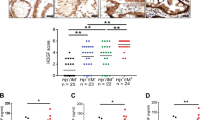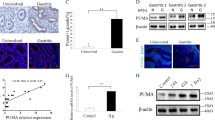Abstract
Infection of gastric mucosa by Helicobacter pylori induces an inflammatory response with increased levels of proinflammatory cytokines. Among them, tumor necrosis factor (TNF)-α, interleukin (IL)-1β and IL-6 induce the activation of signaling pathways that regulate genes expression, such as MUC2 and MUC4 intestinal mucins ectopically detected in gastric tumors. This study evaluated if the predominant inflammatory cell type correlates with MUC2 and MUC4 expression in human intestinal gastric tumors (n=78). In addition, we analyzed the regulatory effects of the associated inflammatory signaling pathways on their expression in gastric cancer cell lines, and in a mouse model with hyperactivated STAT3 signaling pathway. Tumors with predominant lymphoplasmocytic infiltrate (chronic inflammation), presented higher levels of MUC2 and were more differentiated than tumors with predominant polymorphonuclear infiltrate (acute inflammation). These differences can be attributed to specific cytokines, because TNF-α and IL-1β induced MUC2 but no MUC4 expression in gastric cancer cell lines. The two groups of tumors expressed similar levels of MUC4 that correlated with the expression of STAT3 transcription factor, implicated in the activation of genes through the IL-6 pathway. In gastric tissues from gp130+/+, gp130Y757F/Y757F and gp130Y757F/Y757F Stat3−/+ mice, Muc2 was not detected, whereas Muc4 was found in the gastric tumors developed in the gp130Y757F/Y757F mice, with hyperactivated STAT3. These data indicate that the signaling pathways associated with the inflammatory response can modulate the expression of MUC2 and MUC4 intestinal mucin genes, in human and mouse gastric tumors.
This is a preview of subscription content, access via your institution
Access options
Subscribe to this journal
Receive 50 print issues and online access
$259.00 per year
only $5.18 per issue
Buy this article
- Purchase on Springer Link
- Instant access to full article PDF
Prices may be subject to local taxes which are calculated during checkout





Similar content being viewed by others
References
Ahn DH, Crawley SC, Hokari R, Kato S, Yang SC, Li JD et al. (2005). TNF-alpha activates MUC2 transcription via NF-kappaB but inhibits via JNK activation. Cell Physiol Biochem 15: 29–40.
Chaturvedi P, Singh AP, Batra SK . (2008). Structure, evolution, and biology of the MUC4 mucin. FASEB J 22: 966–981.
Crabtree JE, Shallcross TM, Heatley RV, Wyatt JI . (1991). Mucosal tumour necrosis factor alpha and interleukin-6 in patients with Helicobacter pylori associated gastritis. Gut 32: 1473–1477.
de Bolos C, Garrido M, Real FX . (1995). MUC6 apomucin shows a distinct normal tissue distribution that correlates with Lewis antigen expression in the human stomach. Gastroenterology 109: 723–734.
Galon J, Costes A, Sanchez-Cabo F, Kirilovsky A, Mlecnik B, Lagorce-Pages C et al. (2006). Type, density, and location of immune cells within human colorectal tumors predict clinical outcome. Science 313: 1960–1964.
Gartner F, David L, Seruca R, Machado JC, Sobrinho-Simoes M . (1996). Establishment and characterization of two cell lines derived from human diffuse gastric carcinomas xenografted in nude mice. Virchows Arch 428: 91–98.
Gong W, Wang L, Yao JC, Ajani JA, Wei D, Aldape KD et al. (2005). Expression of activated signal transducer and activator of transcription 3 predicts expression of vascular endothelial growth factor in and angiogenic phenotype of human gastric cancer. Clin Cancer Res 11: 1386–1393.
Heazlewood CK, Cook MC, Eri R, Price GR, Tauro SB, Taupin D et al. (2008). Aberrant mucin assembly in mice causes endoplasmic reticulum stress and spontaneous inflammation resembling ulcerative colitis. PLoS Med 5: e54.
Jackson CB, Judd LM, Menheniott TR, Kronborg I, Dow C, Yeomans ND et al. (2007). Augmented gp130-mediated cytokine signalling accompanies human gastric cancer progression. J Pathol 213: 140–151.
Jenkins BJ, Grail D, Nheu T, Najdovska M, Wang B, Waring P et al. (2005). Hyperactivation of Stat3 in gp130 mutant mice promotes gastric hyperproliferation and desensitizes TGF-beta signaling. Nat Med 11: 845–852.
Judd LM, Alderman BM, Howlett M, Shulkes A, Dow C, Moverley J et al. (2004). Gastric cancer development in mice lacking the SHP2 binding site on the IL-6 family co-receptor gp130. Gastroenterology 126: 196–207.
Judd LM, Bredin K, Kalantzis A, Jenkins BJ, Ernst M, Giraud AS . (2006). STAT3 activation regulates growth, inflammation, and vascularization in a mouse model of gastric tumorigenesis. Gastroenterology 131: 1073–1085.
Karin M . (2006). Nuclear factor-kappaB in cancer development and progression. Nature 441: 431–436.
Kim DY, Takeuchi K, Ishinaga H, Kishioka C, Suzuki S, Basbaum C et al. (2004). Roxithromycin suppresses mucin gene expression in epithelial cells. Pharmacology 72: 6–11.
Kimura YN, Watari K, Fotovati A, Hosoi F, Yasumoto K, Izumi H et al. (2007). Inflammatory stimuli from macrophages and cancer cells synergistically promote tumor growth and angiogenesis. Cancer Sci 98: 2009–2018.
Lee HW, Ahn DH, Crawley SC, Li JD, Gum Jr JR, Basbaum CB et al. (2002). Phorbol 12-myristate 13-acetate up-regulates the transcription of MUC2 intestinal mucin via Ras, ERK, and NF-kappa B. J Biol Chem 277: 32624–32631.
Leung WK, Yu J, Chan FK, To KF, Chan MW, Ebert MP et al. (2002). Expression of trefoil peptides (TFF1, TFF2, and TFF3) in gastric carcinomas, intestinal metaplasia, and non-neoplastic gastric tissues. J Pathol 197: 582–588.
Lidell ME, Bara J, Hansson GC . (2008). Mapping of the 45M1 epitope to the C-terminal cysteine-rich part of the human MUC5AC mucin. FEBS J 275: 481–489.
Linden SK, Florin TH, McGuckin MA . (2008). Mucin dynamics in intestinal bacterial infection. PLoS ONE 3: e3952.
Lopez-Ferrer A, Curull V, Barranco C, Garrido M, Lloreta J, Real FX et al. (2001). Mucins as differentiation markers in bronchial epithelium. Squamous cell carcinoma and adenocarcinoma display similar expression patterns. Am J Respir Cell Mol Biol 24: 22–29.
Lopez-Ferrer A, de Bolos C . (2002). The expression of human FUT1 in HT-29/M3 colon cancer cells instructs the glycosylation of MUC1 and MUC5AC apomucins. Glycoconj J 19: 13–21.
Lopez-Ferrer A, de Bolos C, Barranco C, Garrido M, Isern J, Carlstedt I et al. (2000). Role of fucosyltransferases in the association between apomucin and Lewis antigen expression in normal and malignant gastric epithelium. Gut 47: 349–356.
Matsuda K, Yamauchi K, Matsumoto T, Sano K, Yamaoka Y, Ota H . (2008). Quantitative analysis of the effect of Helicobacter pylori on the expressions of SOX2, CDX2, MUC2, MUC5AC, MUC6, TFF1, TFF2, and TFF3 mRNAs in human gastric carcinoma cells. Scand J Gastroenterol 43: 25–33.
Mejias-Luque R, Peiro S, Vincent A, Van SI, de Bolos C . (2008). IL-6 induces MUC4 expression through gp130/STAT3 pathway in gastric cancer cell lines. Biochim Biophys Acta 1783: 1728–1736.
Peek Jr RM, Crabtree JE . (2006). Helicobacter infection and gastric neoplasia. J Pathol 208: 233–248.
Piessen G, Jonckheere N, Vincent A, Hemon B, Ducourouble MP, Copin MC et al. (2007). Regulation of the human mucin MUC4 by taurodeoxycholic and taurochenodeoxycholic bile acids in oesophageal cancer cells is mediated by hepatocyte nuclear factor 1alpha. Biochem J 402: 81–91.
Reis CA, David L, Correa P, Carneiro F, de Bolos C, Garcia E et al. (1999). Intestinal metaplasia of human stomach displays distinct patterns of mucin (MUC1, MUC2, MUC5AC, and MUC6) expression. Cancer Res 59: 1003–1007.
Sell S, Max E . (2001). Immunology, Immunopathology, and Immunity, 6th edn. ASM Press: Washington DC.
Senapati S, Sharma P, Bafna S, Roy HK, Batra SK . (2008). The MUC gene family: their role in the diagnosis and prognosis of gastric cancer. Histol Histopathol 23: 1541–1552.
Tebbutt NC, Giraud AS, Inglese M, Jenkins B, Waring P, Clay FJ et al. (2002). Reciprocal regulation of gastrointestinal homeostasis by SHP2 and STAT-mediated trefoil gene activation in gp130 mutant mice. Nat Med 8: 1089–1097.
Velcich A, Yang W, Heyer J, Fragale A, Nicholas C, Viani S et al. (2002). Colorectal cancer in mice genetically deficient in the mucin Muc2. Science 295: 1726–1729.
Yakata Y, Nakayama T, Yoshizaki A, Kusaba T, Inoue K, Sekine I . (2007). Expression of p-STAT3 in human gastric carcinoma: significant correlation in tumour invasion and prognosis. Int J Oncol 30: 437–442.
Yu H, Jove R . (2004). The STATs of cancer--new molecular targets come of age. Nat Rev Cancer 4: 97–105.
Acknowledgements
We thank the scientists providing the antibodies, Sergi Mojal for statistical analysis, and M Pera, A Dalmases, P Navarro and J Gunnarsson for helpful contributions. This work was supported by Marató de TV3 (050930), Instituto de Investigación Carlos III (PI061421), the Swedish Cancer Foundation and Research Counsil (Cancerfonden and Vetenskapsrådet) and the Jeansson foundation, Sylvia and Charles Viertel Charitable Foundation Senior Medical Research Fellowship, Monash University Fellowship, Cancer Council of Victoria Grant-in-aid, and the Association for International Cancer Research Grant awarded to BJJ.
Author information
Authors and Affiliations
Corresponding author
Rights and permissions
About this article
Cite this article
Mejías-Luque, R., Lindén, S., Garrido, M. et al. Inflammation modulates the expression of the intestinal mucins MUC2 and MUC4 in gastric tumors. Oncogene 29, 1753–1762 (2010). https://doi.org/10.1038/onc.2009.467
Received:
Revised:
Accepted:
Published:
Issue Date:
DOI: https://doi.org/10.1038/onc.2009.467
Keywords
This article is cited by
-
Expression profile of long non-coding RNAs in the intestine of black rockfish Sebastes schlegelii in response to Edwardsiella tarda infection
Journal of Oceanology and Limnology (2023)
-
Gut-disc axis: A cause of intervertebral disc degeneration and low back pain?
European Spine Journal (2022)
-
Increased LIGHT expression and activation of non-canonical NF-κB are observed in gastric lesions of MyD88-deficient mice upon Helicobacter felis infection
Scientific Reports (2019)
-
Using human iPS cell-derived enterocytes as novel in vitro model for the evaluation of human intestinal mucosal damage
Inflammation Research (2018)
-
Helicobacter-induced gastric inflammation alters the properties of gastric tissue stem/progenitor cells
BMC Gastroenterology (2017)



